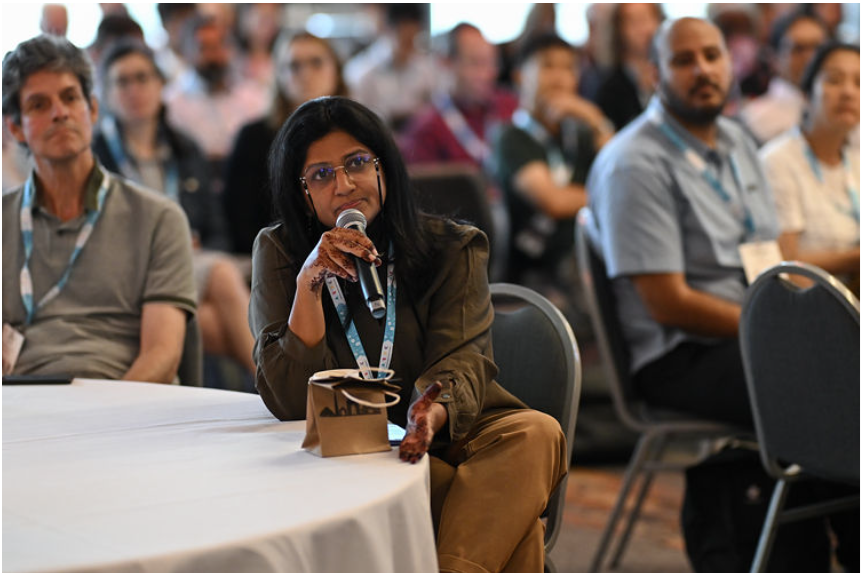Blog Post by Gitanjali Yadav, India
 The opening plenary on CAREful Indigenous Data Governance at the International Data Week 2025 in Brisbane promised to be one of the most important conversations of the week long biennial data conference, and it delivered! The session opened with a respectful acknowledgement of the Traditional Custodians of the land on which we met; the Thurrbal and Yaagera peoples. For me, on my first visit to the southern hemisphere, this was a particularly heartwarming moment as Prof. Tony Heymet, the Australian chief scientist and Dr. Margaret Sheil, Vice Chancellor of the Queensland University of Technology paid respects to Elders past and present, all Aboriginal and Islander peoples, honouring their enduring connection to knowledge, and to storytelling, the world’s oldest continuous data system, recognising how their wisdom continues to guide how we gather, share, and care for knowledge.
The opening plenary on CAREful Indigenous Data Governance at the International Data Week 2025 in Brisbane promised to be one of the most important conversations of the week long biennial data conference, and it delivered! The session opened with a respectful acknowledgement of the Traditional Custodians of the land on which we met; the Thurrbal and Yaagera peoples. For me, on my first visit to the southern hemisphere, this was a particularly heartwarming moment as Prof. Tony Heymet, the Australian chief scientist and Dr. Margaret Sheil, Vice Chancellor of the Queensland University of Technology paid respects to Elders past and present, all Aboriginal and Islander peoples, honouring their enduring connection to knowledge, and to storytelling, the world’s oldest continuous data system, recognising how their wisdom continues to guide how we gather, share, and care for knowledge.
This opening plenary brought together global efforts to empower indigenous communities based on CARE foundational principles. For me, this session resonated very well with my own continuing reflections on “Who owns our knowledge?”, the theme of this year’s global ‘Open Access Week’, not only as a call to action but also as an inspiration for important conversations and collaborations around the globe. The answer can be found in the systems we build, the policies we uphold, and the communities we empower. Chaired with characteristic grace by Rosie Hicks, the session brought together three very distinct voices: Marcia Langton (Australia), Niklas Lábba (Sápmi, Sweden), and Alfred J. P. Lin (Taiwan) , each addressing how data, culture, and governance intersect in profoundly different ways. It was, in many ways, a masterclass in contrast!
When Alfred J. P. Lin opened his talk with a background on Taiwan’s Indigenous Peoples (TIP), expectations were high. His talk, “How Scientific Computing, Data Science, and Open Science Revitalize and Empower Hard-to-Reach Populations” promised a 20-year perspective on digital empowerment. Yet to me, his presentation felt curiously detached from the communities it claimed to serve. The TIP data science framework was impressive in scope but seemed to prioritize system architecture over sovereignty. My concern is that even as we strive to foster self-determination, promote equitable partnerships, and address historical injustices, can scientific computing and open data ever truly empower Indigenous communities, or are we merely empowering institutions that have the infrastructure to process and publish those data? When I asked who owns the Indigenous knowledge generated in his projects; his research institute? the Taiwanese government? Or was it owned by the TIPs themselves, there was no clear answer. It was an unsettling moment. The question went to the heart of the session’s theme: CAREful governance requires clarity of authority and accountability. Without that, “empowerment” risks becoming just another research deliverable.
Still, this moment of discomfort was revealing. It reminded us that CARE, Collective Benefit, Authority to Control, Responsibility, and Ethics cannot be retrofitted onto systems that were never co-designed with communities in the first place. And this point was brought home beautifully by Niklas Lábba, whose talk “Knowledge, Culture and Business Data” was a revelation to me and easily among the most memorable talks of the entire week. Speaking as both a Sámi scholar and practitioner, he illustrated how cultural and business data are not opposing domains but co-dependent systems. His articulation of “data as kinship”, the idea that information can maintain or disrupt relationships, deeply resonated with me. Niklas didn’t just speak about data; he embodied a worldview in which data governance is a living, relational practice. His message was practical yet poetic: data governance that doesn’t nurture relationships will eventually fail.
The final talk of the session by Marcia Langton was delivered with huge intellectual clarity and unmistakable authority, as the author spoke from the lived realities of Australian Indigenous communities and the long journey toward data sovereignty. I loved Marica, and her unapologetically political framing! She emphasized (and the audience agreed) that governance begins with recognition of power; who holds it, who enforces it, and who benefits from the flow of data. She reminded us that Indigenous data governance is not a technical framework but a political project, one that demands trust, time, and truth-telling. Her clarity on the stakes of sovereignty, that no principle of FAIR or CARE can substitute for Indigenous control, set a high bar for the entire conference.
Taken together, the #IDW2025 opening plenary offered a vivid panorama of where we stand in the global conversation on Indigenous data:
- Langton grounded us in the politics of definition: that “governance” itself must be Indigenous-led.
- Lábba showed us the poetry and pragmatism of data sovereignty lived every day.
- Lin exposed, perhaps unintentionally, how far we still need to go when scientific ambition outpaces ethical reflection.
As a member of the CODATA International Data Policy Committee, I left the room convinced that our policy work must continue to challenge not just how data is shared, but who decides what sharing means. This session and its conversations reminded us all that policy isn’t about perfect frameworks; it’s about courage. The courage to ask uncomfortable questions, to hold silence when answers don’t come, and to keep insisting that “open” must never mean “unaccountable.” The future of data governance won’t be built in servers or standards: it will be built in trust.

Dr. Gitanjali Yadav is a senior scientist at the National Institute of Plant Genome Research (NIPGR), India and the cofounder of #semanticClimate, a global citizen science movement for climate action. She also serves as co-chair of the International Data Policy Committee (IDPC) of CODATA and strongly advocates FAIR principles and Open Access. As an editor of CODATA’s Data Science Journal (DSJ), she chaired the IDW2025 session on “An evolving role of data scientists in the age of intelligent automation”. With CODATA India, Gita in working towards shaping the next generation of open, interoperable, and globally FAIR research assessment tools and welcomes participation from researchers, data scientists, policy experts, infrastructure developers, and early-career professionals interested in AI-ready, federated data access (data visitation) through Metadata, ontology, and semantic enrichment, as well as in reciprocal learning for equitable data ecosystems, specially across the Global South. Gita can be found on Linkedin, and contacted via email (gy@nipgr.ac.in). She will present her reflections on ‘Who Owns Our Knowledge’ at the New York Tech Libraries (NYIT) Open Access Week on October 24, 2025.









